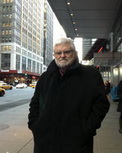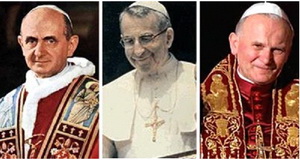 Chris
McDonnell, UK
Chris
McDonnell, UKchristymac733@gmail.com
 Chris
McDonnell, UK
Chris
McDonnell, UK
christymac733@gmail.com
Previous articles by Chris Comments welcome here
August
8, 2018
Year
of three Popes
Last
week I wrote about Transfiguration and the coincidence of the date
matching that of the Hiroshima nuclear attack. It was also the date on
which Paul VI died at Castel Gandolfo in Italy in 1978, forty years ago
this year. That date began an extraordinary sequence of events and led to
1978 being given the name of the Year of the Three Popes.
Paul
VI had been Bishop of Rome for some fifteen years, following in the
footsteps of John XXIII, a difficult journey for anyone to contemplate. It
fell to Paul VI to bring the Council to a close and then to guide the
Church through the tempestuous and war-torn years of the 60s and 70s.
With
his death the due process of Conclave followed, when Cardinals world-wide
were summoned to Rome to begin the process of electing his successor.
It
was by all accounts that August, in the heat of a Roman summer, an
uncomfortable gathering. On the fourth ballot, the name of the patriarch
of Venice, Albino Luciani, received a significant majority of votes. So it
was on the evening of August 26th when the announcement of his election
was given to a crowded St Peter's square and his choice of name, John Paul
I made known. He quickly became known as the 'smiling pope'.
But
his residency in Rome was to be brief for, some thirty three days later,
on September 28th, this quiet, reserved man died of a heart attack. He was
found in his bed on the morning of the 29th, his book, the Imitation of
Christ, still open and the bedside light still on. The second pope of 1978
had been taken by the Lord. His funeral on October 4th was celebrated by
Cardinal Confalonieri who spoke of John Paul as 'a flashing comet who
briefly lit up the Church'. Yes, his papacy was brief but in so many ways
it indicated the path that Francis would tread many years later.
On
a lighter note, we had just moved house that September and to ease the
loss of friends, we bought my son a hamster, who promptly got given the
name 'John Paul'. When I heard the morning news and called upstairs that
'John Paul is dead', the howl from his bedroom only ceased when the
confusion was explained.
So
for a second time, the Cardinals were summoned to Italy. Again it was to
be a short conclave. It began on October 14th and after eight ballots, the
Cardinal Archbishop of Krakow, Karol Wojtyla, was elected to the See of
Rome, taking the name of John Paul II. It was the start of a long,
significant and at times controversial papacy. Born in Poland in May 1920,
he was a young man at the time of election by the college of Cardinals.
Being Polish, he broke with recent tradition of an Italian papacy. His
experience of living in Communist Eastern Europe contributed to his
playing a major part in the collapse of Communism in 1989, when country
after country of the Eastern bloc rejected the totalitarianism of the
Soviet era and 'the Iron Curtain', in Churchill's memorable phrase
describing the division of post War Europe, became part of history.
Yet
only three years after his election, on Wednesday, 13 May 1981, in the
square outside St Peter's, the Pope was shot and wounded by Mehmet Ali
Agca. He was hit four times, and suffered severe injury. His would-be
assassin was apprehended immediately and received a life-sentence from an
Italian court. The Pope later forgave Ağca for the assassination
attempt.
The
later years of his papacy were marked by a conservative pattern of
leadership as many subtle, and at times, not so subtle, attempts were made
to inhibit the decrees of the Council.
He
was without doubt a heroic figure, who travelled extensively, and his
visit to the UK at the time of the Falklands War was a memorable event.
So
1978, the Year of Three Popes concluded. Peter Hebblethwaite
wrote
a very good account of that momentous Summer and Autumn with just that
title, The Year of Three Popes. It is still available and well worth
reading.
That
time now is history though forty years on, its influence is still felt.
John Paul I wanted to address the crowded square after his election but he
was reminded by the papal master of ceremonies that it was not usually
'the done thing'. How different
when
Francis stood on that same spot in 2013 and began
"Good
evening! You know that the duty of the conclave was to provide Rome with a
bishop. It looks as if my brothers the cardinals went to fetch him from
the end of the world!".
Yes,
a long journey, but of benefit to us all.
END

====